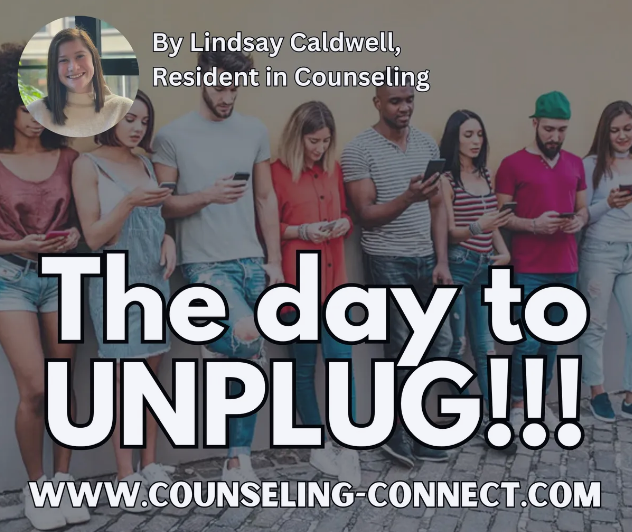By Lindsay Caldwell, Resident in Counseling, CFRA
In today’s world, we are dominated by digital devices with apps and platforms that monopolize our attention. Finding moments of true rest and rejuvenation can be challenging. The National Day of Unplugging offers a timely reminder of the importance of stepping away from screens and embracing real connection in the present moment. This annual event, typically observed on the first Friday in March, encourages individuals to disconnect from their electronic devices and reconnect with themselves, their loved ones, and the world around them.
Beyond its symbolic significance, the National Day of Unplugging also brings to light the significant mental health benefits associated with taking a break from technology such as:
1. Reduced Stress and Anxiety. Taking a break from constant notifications and digital distractions can help alleviate stress and anxiety. Without the pressure to constantly check emails, social media updates, or news alerts, individuals can experience a greater sense of calm and relaxation.
2. Improved Sleep Quality. Exposure to screens before bedtime has been linked to disrupted sleep patterns and insomnia. By unplugging before bed, individuals can create a more conducive environment for restful sleep, leading to improved overall well-being.
3. Enhanced Presence and Mindfulness. In the words of John Kabat-Zinn (1994), “Mindfulness means paying attention in a particular way, on purpose, in the present moment, and nonjudgmentally.” The practice of mindfulness has been shown to improve mental health benefits over the long term for many people. And when we aren’t glued to our screens, it’s easier to be mindful, to engage more deeply with our surroundings, and connect with loved ones in our daily lives.
4. Stronger Relationships. Excessive screen time can detract from the quality of our interpersonal relationships. By unplugging, we create space for meaningful conversations, shared experiences, and genuine connections with others.
5. Increased Productivity and Creativity. Constant digital distractions can hinder our ability to focus and think creatively. Unplugging allows us to reclaim our time and attention, fostering greater productivity and inspiration.
Tips for Observing the National Day of Unplugging
1. Set Clear Boundaries. Establish specific times when you will disconnect from your devices and stick to them.
2. Find Offline Activities. Identify offline activities that bring you joy and fulfillment, such as reading, spending time outdoors, exercise, or relaxation.
3. Communicate with Others. Let your friends, family, and colleagues know that you’ll be unplugging and encourage them to join you or respect your boundaries.
4. Reflect on the Experience. Take some time to reflect on how you feel when you’re unplugged. Consider incorporating more screen-free time into your regular routine.
In our increasingly digitized world, the National Day of Unplugging serves as a powerful reminder to prioritize our mental health and well-being. By disconnecting from our screens and reconnecting with ourselves and others, we can experience a greater sense of balance, presence, and fulfillment in our lives. So, mark your calendars, power down your devices, and embrace the opportunity to disconnect and recharge! Your mental health will thank you for it.
If you’re interested in learning more about mindfulness techniques and other ways to reduce stress, therapy can help. Counseling Connect is accepting new self-pay and Medicaid clients. Visit our website to book an appointment today! www.counseling-connect.com.
References:
Kabat-Zinn, J. (1994). Wherever you go, there you are.Hyperion: New York.
Lufkin, B. (2019). Why unplugging regularly could save yourcareer. BBC Worklife.
Gomes, M., Mary Gomes. (2018, April 25). Five reasons to take a break from screens. Greater
Good. https://greatergood.berkeley.edu/article/item/five_reasons_to_take_a_break_from_screens

